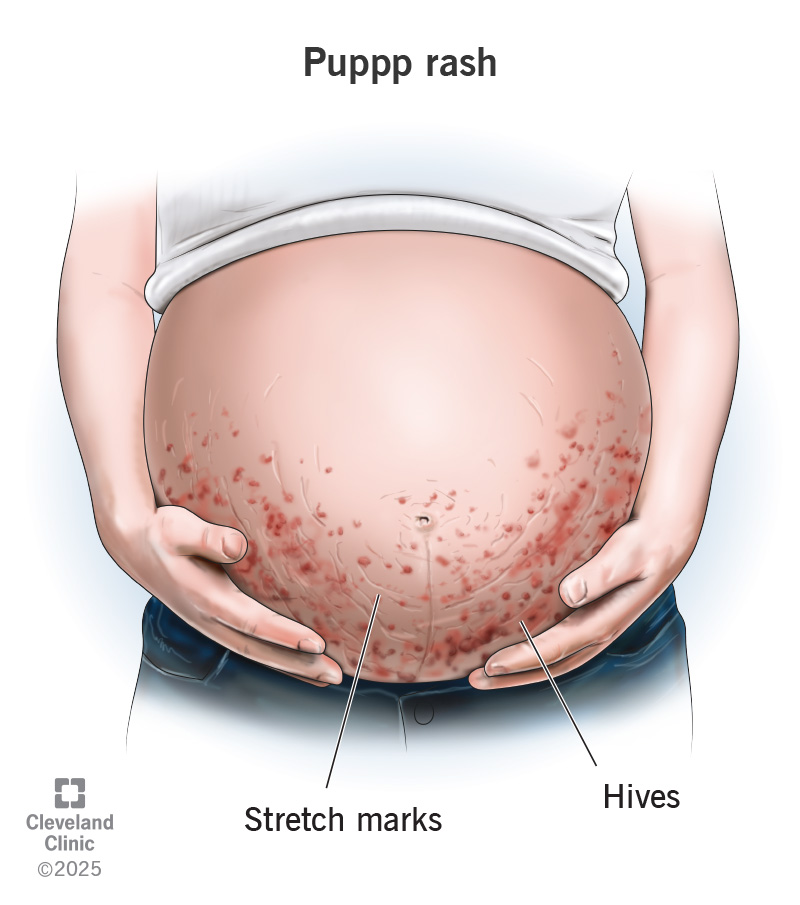PUPPP is an extremely irritating hive-like rash that can affect you during pregnancy. It’s harmless to both you and your baby, but it can be a pain to manage in the meantime. Your healthcare provider can recommend treatments to relieve the itching. PUPPP usually goes away on its own after your baby is born.
Advertisement
Cleveland Clinic is a non-profit academic medical center. Advertising on our site helps support our mission. We do not endorse non-Cleveland Clinic products or services. Policy

Image content: This image is available to view online.
View image online (https://my.clevelandclinic.org/-/scassets/images/org/health/articles/22374-puppp-rash)
PUPPP is an itchy rash that can happen during pregnancy. The letters PUPPP stand for “pruritic urticarial papules and plaques of pregnancy.” PUPPP rash is a patch of itchy, hive-like bumps that form in the stretch marks on your belly. It can spread to other parts of your body, like your thighs, breasts and arms.
Advertisement
Cleveland Clinic is a non-profit academic medical center. Advertising on our site helps support our mission. We do not endorse non-Cleveland Clinic products or services. Policy
PUPPP is harmless to both you and your baby. It usually shows up late in your pregnancy and lasts from four to six weeks. It goes away within a few weeks of your baby being born. PUPPP rashes are one of the most common skin conditions during pregnancy. They appear in about 1 in every 160 pregnancies.
PUPPP rashes look and feel a lot like hives. Here are some signs that you may have PUPPP:
No one knows for sure what causes PUPPP, but the cause may have something to do with stretch marks. The most popular theory is that your belly gets so big so fast that your skin cells can’t keep up. That’s when you see stretch marks. Stretching damages your skin’s connective tissue and causes inflammation. This leads to a bumpy rash to form on your skin.
Advertisement
Another theory suggests that hormone changes during pregnancy cause PUPPP.
Regardless of the cause, PUPPP rash is an unpleasant annoyance when you’re pregnant.
PUPPP shows up late in pregnancy, usually around week 35 in your third trimester. Less commonly, PUPPP rashes appear shortly after delivery. Your chances of getting PUPPP increase if:
PUPPP doesn’t usually show up during the first and second trimesters. If you notice an itchy rash, see your provider to rule out other skin conditions, like contact dermatitis.
Your provider will do a physical exam to see if you have PUPPP. If there’s a question about whether you have PUPPP or a different skin condition, your provider may order tests to be sure. Your provider may order any of the following:
If it’s tough to tell for sure whether your rash is PUPPP, your provider may order a biopsy to test a skin sample.
PUPPP usually lasts for about four to six weeks. It usually goes away on its own within a few days to a few weeks after your baby is born. Scratching doesn’t spread PUPPP, but it can make the itching worse.
While you wait for your rash to disappear, medication and home remedies can help ease your symptoms.
Take care of your skin by:
If home remedies don’t help, your provider can recommend medications. Keep in mind that your pregnancy care provider should approve any medications you’re taking when you’re pregnant, even over-the-counter ones. Your provider may suggest you try:
Antihistamines and corticosteroids usually ease the itching within a day or two.
Contact your pregnancy care provider if you think you have PUPPP. They can suggest at-home treatments or medications that are safe for pregnancy. It’s best to get their approval for any medications you use during pregnancy, even over-the-counter ones.
PUPPP can be irritating while it lasts, but there’s a light at the end of the tunnel. PUPPP rashes go away after your baby is born. It usually doesn’t leave scars. Also, having PUPPP rash during one pregnancy means that you’re less likely to have it in future pregnancies. While you do have PUPPP, work with your provider to ease the itching. Don’t take or use medications until you talk to your pregnancy care provider.
Advertisement
Having an itchy PUPPP rash appear right when you’re feeling the most impatient for your baby to arrive can feel agonizing. If you’re noticing signs of PUPPP, don’t wait to get relief for your symptoms. Your provider can help with your diagnosis and suggest ways to manage your itching so it doesn’t keep you up at night. PUPPP can be an annoyance, but it’s a temporary one. Most rashes go away shortly after your baby is born.
Advertisement
Learn more about the Health Library and our editorial process.
Cleveland Clinic's health articles are based on evidence-backed information and review by medical professionals to ensure accuracy, reliability, and up-to-date clinical standards.
Cleveland Clinic's health articles are based on evidence-backed information and review by medical professionals to ensure accuracy, reliability, and up-to-date clinical standards.
From routine pelvic exams to high-risk pregnancies, Cleveland Clinic’s Ob/Gyns are here for you at any point in life.
